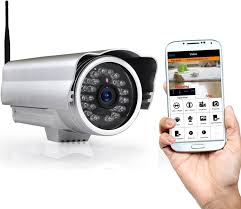The Advantages of IP Surveillance Cameras in Modern Security Systems
IP surveillance cameras, also known as network cameras, have revolutionized the way we approach security monitoring in both residential and commercial settings. These cameras utilize Internet Protocol (IP) technology to transmit video data over a network, providing numerous advantages over traditional analog CCTV systems.
Enhanced Image Quality
One of the key benefits of IP surveillance cameras is their superior image quality. These cameras can capture high-definition video footage, allowing for greater clarity and detail in monitoring activities. This improved image quality is essential for identifying individuals and objects in security footage.
Remote Access and Monitoring
With IP surveillance cameras, users can access live video feeds and recorded footage remotely from any location with an internet connection. This feature enables real-time monitoring of security cameras through smartphones, tablets, or computers, providing enhanced flexibility and convenience for users.
Scalability and Flexibility
IP surveillance systems offer scalability and flexibility that are unmatched by traditional CCTV setups. Users can easily add additional cameras to their network without the need for complex cabling or infrastructure changes. This scalability allows for seamless expansion of security coverage as needed.
Advanced Analytics and Integration
Many IP surveillance cameras come equipped with advanced analytics capabilities that enhance security monitoring efficiency. Features such as motion detection, facial recognition, and license plate recognition provide valuable insights for proactive security measures. Additionally, these cameras can integrate with other security systems for comprehensive protection.
Cost-Effectiveness
While the initial investment in IP surveillance cameras may be higher than analog alternatives, the long-term cost-effectiveness of these systems is undeniable. With lower maintenance requirements, reduced cabling costs, and enhanced functionality, IP surveillance cameras offer a superior return on investment over time.
Conclusion
In conclusion, IP surveillance cameras represent a significant advancement in modern security systems due to their enhanced features and capabilities. From improved image quality to remote access options and advanced analytics, these cameras provide a comprehensive solution for effective security monitoring. As technology continues to evolve, IP surveillance cameras will remain at the forefront of ensuring safety and protection in various environments.
Understanding IP Surveillance Cameras: Key Questions and Answers
- What are the disadvantages of IP security cameras?
- What is an IP security camera?
- What is the difference between IP camera and security camera?
- Can IP cameras work without internet?
What are the disadvantages of IP security cameras?
When considering IP security cameras, it is important to acknowledge some of the disadvantages associated with these advanced surveillance systems. One common drawback is the initial cost, as IP cameras tend to have a higher upfront investment compared to traditional analog CCTV cameras. Additionally, the complexity of network setup and configuration may pose challenges for users without technical expertise. Another potential disadvantage is the reliance on a stable internet connection for remote access and monitoring, which could be a concern in areas with limited connectivity or during network outages. Despite these drawbacks, the benefits of enhanced image quality, remote accessibility, and advanced features often outweigh the limitations for many users seeking comprehensive security solutions.
What is an IP security camera?
An IP security camera, also known as an Internet Protocol camera, is a type of surveillance device that captures and transmits video footage over a network connection. Unlike traditional analog CCTV cameras, IP security cameras digitize and compress video data before transmitting it over an IP network. This digital technology allows for higher-quality video recordings, remote access to live feeds, and advanced features such as motion detection and integration with other security systems. In essence, an IP security camera offers a modern and efficient solution for monitoring and enhancing security in various environments.
What is the difference between IP camera and security camera?
When comparing an IP camera to a traditional security camera, the key difference lies in their method of data transmission and connectivity. An IP camera, also known as a network camera, utilizes Internet Protocol technology to transmit video data over a network, typically through Ethernet or Wi-Fi connections. On the other hand, a security camera refers to a broader category that includes both analog CCTV cameras and digital IP cameras. While traditional security cameras may rely on analog signals and closed-circuit systems for monitoring, IP cameras offer advanced features such as remote access, high-definition video quality, and seamless integration with other security systems. Overall, the distinction between an IP camera and a security camera lies in the technological capabilities and connectivity options that IP cameras provide for modern surveillance needs.
Can IP cameras work without internet?
Many people wonder if IP cameras can function without internet connectivity. The answer is yes, IP cameras can work without an internet connection. While internet access is typically required for remote viewing and accessing advanced features like cloud storage, local recording and monitoring are possible without being connected to the internet. By utilizing a local network or storage device, IP cameras can continue to capture and store footage even when offline, ensuring continuous surveillance capabilities in various settings.

